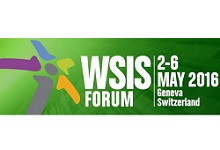WSIS Forum 2016 – Moderated high-level policy session – 04.05 Part 2
4 May 2016 07:00h
[Read more session reports and live updates from the WSIS Forum 2016.]
The session was divided into four sections that tackled a wide range of topics, from the digital economy to trust and cybersecurity, and from climate change to cultural diversity.
The first section (Session Ten), facilitated by Ms Marilyn Cade (Board member, WAVE), looked at issues related to the Digital Economy and Trade, and their potential contribution to achieving the sustainable development goals (SDGs). Mr Torbjorn Fredriksoon (Chief of ICT Analysis Section, UNCTAD) underlined the need to further enhance the use of information and communication technologies (ICTs) by the business sector, especially in developing countries. Noting that the ICT industry is becoming the backbone of the economy, governmental representatives from Indonesia, Iran, Sri Lanka, and the United Kingdom spoke about measures that countries need to take to support this industry and the broader use of ICTs for the development of other economic sectors (such as agriculture, transport, commerce, etc.). Improving regulatory frameworks, adopting and implementing ICT strategies that are truly correlated with actual user needs, building and preserving users’ trust in the digital economy, and empowering citizens to take advantage of the opportunities offered by the digital economy were examples of such measures. Preserving the Internet as an open, free, secure, and global resource was highlighted as being key to ensuring that this network can be efficiently used as a tool to accelerate economic and social progress.
Enabling Environment, Cybersecurity, and Climate Change were topics tackled during the second section (Session Twelve), facilitated by Ms Anna Slomovic (Lead Research Scientist, Cyber Security and Privacy Research Institute, George Washington University). Governmental representatives from Chad and the Democratic Republic of Congo spoke about the key elements of an enabling environment that would allow ICTs to unleash their developmental potential: legal frameworks that are adapted to technological progress; public policies aimed at ensuring deployment of an ICT infrastructure (including broadband) at national level; and capacity-building programmes aimed at equipping citizens with digital skills. Mr Jailani Bin Johari (Deputy Minister, Ministry of Communications and Multimedia, Malaysia) and Mr Matthew Rajendra (Founder and CEO, Green Data Center) underlined the need to ensure that ICT resources are used efficiently, and that governments and the private sector work together to tackle environmental challenges such as the carbon footprint and e-waste. Mr Dirk Van Eeckhout (Thematic Coordinator for the Information Policy, Council of Europe) said that there is no need for an international UN binding instrument on cybercrime; he also spoke about the Council of Europe Convention on Cybercrime, to which one-third of the UN membership is now part. Mr Grigore Varanita (Director, National Regulatory Agency for Electronic Communications and Information Technology, Moldova) and Ms Brenda Aynsley (Chairman, International Professional Practice Partnership) spoke about building trust and confidence in the use of ICTs. Varanita touched on the role of telecom regulatory authorities, especially with regard to setting and enforcing rules on security of networks, security and protection of personal data, and security of data usage. Aynsley also noted that tech companies should focus more on ensuring the professionalism of their workers.
The section on WSIS Action Lines and the 2030 Agenda, Financing for Development and Role of ICT (Session Fourteen), facilitated by Ms Iffat Gill (Head, ChunriChoupaal – The Code to Change) had as an underpinning message the fact that financing is crucial for the development of the ICT economy and the information society. Governmental representatives from Azerbaijan, Namibia, Argentina, Portugal, and Tunisia spoke about how governmental programmes, intergovernmental organisations funding projects, and public-private partnerships can and should contribute to bridging the digital divide, in its various dimensions (access to infrastructure, gender inequalities, access for people with disabilities, digital literacy, affordability, etc.). It was noted that access to ICTs is key to empowering people to have access to information, knowledge, employment opportunities, etc. As a concluding remark, Ambassador Daniel Sepulveda (Deputy Assistant Secretary, Bureau of Economic and Business Affairs, USA) said that ICTs should not be seen as an end, but as a tool to further other aims; public policies and financing mechanisms are needed to advance the abilities of people to access such ICT tools.
The final section (Session Sixteen), facilitated by Ms Lori S. Schulman (Senior Director, Internet Policy, International Trademark Association), focused on Media, Cultural Diversity and Heritage, Linguistic Diversity and Local Content, Ethical Dimensions of Information and Knowledge Societies. It was said that the availability of local content in local languages, and the possibility to access and create such content should be at the core of all discussions on access. Two examples were given of initiatives dedicated to empowering local communities to access and create content relevant to them: the work done by the Bangladesh NGOs Network for Radio and Communication to allow communities to use their languages/dialects for accessing knowledge and information, and the application developed by Bridge Africa with the aim of allowing people to create and access online content via text messages. The programme on immersive education run by the World VR Forum (which makes use of virtual reality to promote education through experience) and the initiative of the Cybervolunteers Foundation (which relies on the work of cybervolunteers to educate people on the use of ICTs) were also mentioned. Internet governance was another topic touched on, with Mr Richard Hill (President, Association for Proper Internet Governance) talking about the need to properly implement the multistakeholder model, as well as the principles of participative and representative democracy in the Internet governance process.
by Sorina Teleanu
Related topics
Related event

